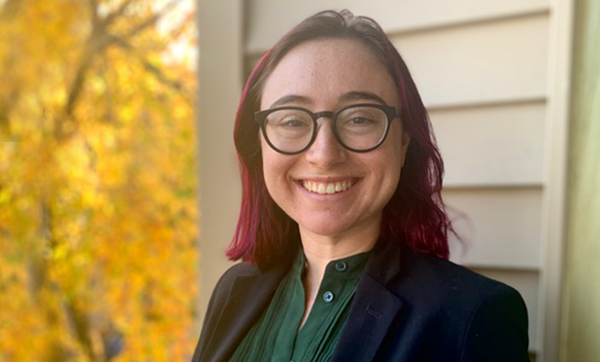Student Receives Public Health Education Award from APHA.
Student Receives Public Health Education Award from APHA
MPH student Margaret Burkhardt received the award for her work leading research that reimagines public health literacy in infectious disease outbreak settings.
Margaret Burkhardt, a second-year MPH student at the School of Public Health, recently received the Public Health Education and Health Promotion Student Award from the American Public Health Association (APHA). She accepted the award and gave an oral presentation of her work at APHA’s Annual Meeting, held November 6-9 in Boston.

The award recognizes students at the doctoral, masters, or undergraduate level who are the first author of an applied research or evaluation project. Burkhardt’s project was among the top five highest-scoring abstract submissions for the category.
Throughout the last year, Burkhardt, who is focusing her studies at the intersection of infectious disease and health communication at SPH, has led a scoping review of the literature around health literacy and public health literacy in infectious disease and outbreak settings. Her paper works to identify relevant concepts and gaps in the literature and presents a newly developed framework for advancing public health literacy in outbreak settings. This concept of public health literacy, Burkhardt emphasizes, centers on the health of communities, rather than individuals, and encompasses a community’s ability to understand, evaluate, and respond to rapidly changing public health information with the goal of empowering collective agency to make public health decisions that benefit the community.
“The culture around health in the United States has long focused on the individual, which often means that we fail to consider how our health affects those around us,” she says. “However, the COVID-19 pandemic and the widespread misinformation and disinformation that came with it, has forced us to reimagine how to take action and empower decision-making at the community level to prevent disease spread.”
The framework provides a strong foundation for the development of educational materials, measurement tools, and additional research to advance public health literacy, create a model of community care, and effectively reduce the spread of misinformation and disinformation in future outbreak settings.
“We hope that by creating this explicit framework, we can start educating people on public health as it pertains to infectious disease so that when the next inevitable disease outbreak occurs, there will be less confusion, less fear, and a higher uptake in public health prevention methods because there is a wider understanding of why these methods are important for both individuals and their surrounding communities,” says Burkhardt. “We also hope that by providing this basis of public health education, there will be less misinformation and disinformation spread because people will have the skills to recognize scientifically-accurate information and more critically analyze what they see presented in the media.”
This project was supported by a pilot grant from the Boston University Center for Emerging and Infectious Diseases Policy & Research (CEID). Burkhardt worked closely with principal investigators Eleanor Murray, assistant professor of epidemiology, and Jennifer Weuve, associate professor of epidemiology, on the project. Other co-authors include Traci Hong, associate professor of media science at BU and a core faculty member at CEID, and Syra Madad, senior director of the System-wide Special Pathogens Program at NYC Health + Hospitals and an affiliate faculty member at CEID.
“Over the past year, Maggie has blended findings from the literature with the ecosocial framework of disease distribution and knowledge about communicable diseases to construct a framework that will empower groups and communities to respond to future outbreaks and benefit from the responses,” says Weuve. “I am incredibly proud of Maggie and her work to convey very abstract ideas in a way that is both compelling and relevant to the public’s health.”